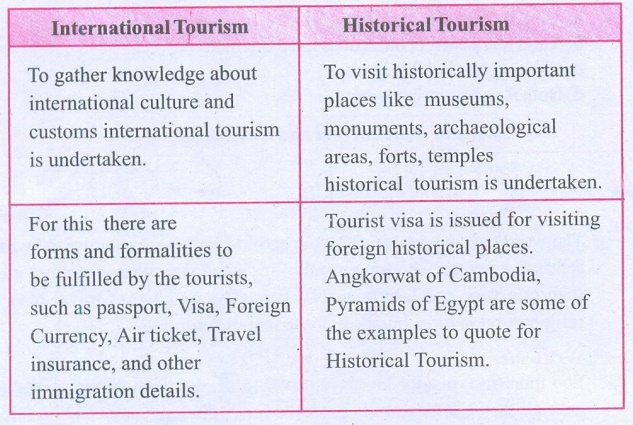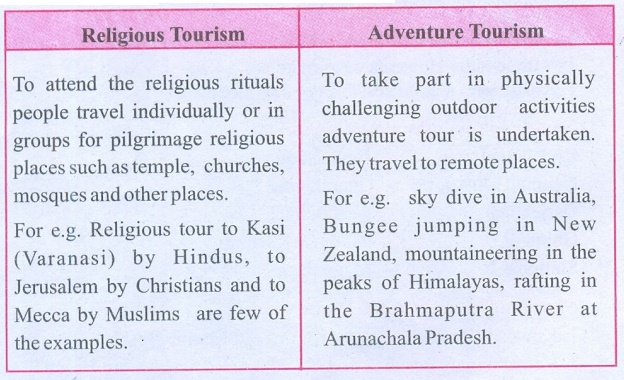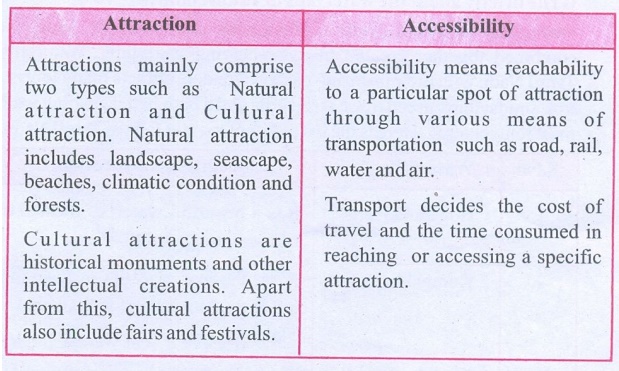Tourism | Term 2 Unit 2 | Geography | 7th Social Science - Exercises Questions with Answers | 7th Social Science : Geography : Term 2 Unit 2 : Tourism
Chapter: 7th Social Science : Geography : Term 2 Unit 2 : Tourism
Exercises Questions with Answers
Evaluation
I. Choose the correct answer
1. The oldest type of tourism is _________________
a)
Religious
b)
Historical
c)
Adventure
d)
Recreational
Answer: a)
Religious
2. In which state is the Kaziranga
national park located.
a)
Rajasthan
b)
West Bengal
c)
Assam
d)
Gujarat
Answer: c) Assam
3. Which one of the following is not
a beach of India?
a)
Goa
b)
cochin
c)
Kovalam
d)
Miami
Answer: d) Miami
4. Which of the following is not a
bird sanctuary in India?
a)
Nal sarovor in Gujarat
b)
Koonthakulam in Tamil Nadu
c)
Bharatpur in Rajasthan
d)
Kanha in Madhya Pradesh
Answer: d) Kanha in
Madhya Pradesh
5. In which district courtallam waterfalls
is located?
a)
Dharmapuri
b)
Tirunelveli
c)
Namakkal
d)
Tenkasi
Answer: d) Tenkasi
II. Fill in the blanks
1.
The three main components of tourism together known as A3 concept.
2.
Gastronomy refers to an aspect of cultural tourism.
3.
Suruli falls is also called as Cloud Land falls (or) Meghamalai falls.
4.
The second largest urban beach is Marina Beach in Chennai.
5.
Expansion of TAAI Travel Agents Association of India.
III. Circle the Odd
one
1.
Transport,
Attraction, Accommodation, Amenities
2.
Nainital, Shillong, Munnar, Digha
3.
Corbett, Sunbarbans, periyar, Mayani
4.
Hogenakal, Kumbakkari, Suruli, Kalakad
5.
Rishikesh, ladakh,
Gulmarg, Kotagiri
IV. Match the following
1.
Anamalai hills - West Bengal
2.
Monkey falls - Goa
3.
Darjeeling - Coimbatore
4.
Nature’s Haven - Top slip
5.
Aguda Beach – Javadi
Answer:
1. Anamalai hills - Top slip
2. Monkey falls - Coimbatore
3. Darjeeling - West
Bengal
4. Nature’s Haven - Javadi
5. Aguda Beach - Goa
V. Consider the following
statement and tick (✓) the appropriate answer
1. Asseration (A) : Tourism is an essential
activity for the life of the society
Reason (R) : Its direct
impact on social cultural, education and economic sector of the nation.
a.
A and R are correct and A explains R
b.
A and R are correct but A does not explain R
c.
A is in correct but R is correct
d.
Both A and R are in Correct
Answer: a. A and R are correct and A explains R
2.
Assertion (A) : One of the most popular
beaches in Goa Calangute is a treat for the adventure sports activities.
Reason (R) : Foreigners
throng the beaches
a.
A and R are correct and A explain R
b.
A and R are correct but A does not explain R
c.
A is incorrect but R is correct
d.
Both A and d. R are incorrect
Answer: a. A and R are correct and A explain R
VI. Answer the following
briefly
1. Define Tourism?
The word tourist was derived from an old English word “tourian”
which refers to a person who travels out of his usual environment for not more
than one year and less than 24 hours. The purpose of travel may be religious,
recreation, business, historical and cultural.
2. Write short note on ECO Tourism?
Eco tourism typically involves travel to destinations where
plants and animals thrive in a naturally preserved environment. Amazon rain
forest, African forest safari, trekking in the slopes of Himalayas are the
famous incredible Eco friendly attractions.
3. What are the basic elements of
Tourism?
The three main elements of tourism are
1. Attraction
2. Accessibility
3. Amenities.
4. Name any five hill stations in
India?
Kodaikanal
- Tamil Nadu
Nainital, Mussoorie
- Uttarakhand
Darjeeling
- West Bengal
Gulmarg
- Jammu & Kashmir
Shillong - Meghalaya
5. Name any five beaches in Tamil
Nadu?
1. Kovalam Beach
2. Marina Beach
3. Kanyakumari Beach
4. Rameshwaram Beach
5. Elliot Beach
VII. Distinguish between
1. International Tourism and Historical
Tourism

International
Tourism
• To gather knowledge
about international culture and customs international tourism is undertaken.
• For this there are
forms and formalities to be fulfilled by the tourists, such as passport, Visa,
Foreign Currency, Air ticket, Travel insurance, and other immigration details.
Historical Tourism
• To visit historically
important places like museums, monuments, archaeological areas, forts, temples
historical tourism is undertaken.
• Tourist visa is issued for visiting foreign historical places.
Angkorwat of Cambodia, Pyramids of Egypt are some of the examples to quote for
Historical Tourism.
2. Religious Tourism and Adventure
Tourism

Religious Tourism
• To attend the religious rituals people travel individually or
in groups for pilgrimage religious places such as temple, churches, mosques and
other places.
• For e.g. Religious tour to Kasi (Varanasi) by Hindus, to
Jerusalem by Christians and to Mecca by Muslims are few of the examples.
Adventure Tourism
• To take part in physically challenging outdoor activities
adventure tour is undertaken. They travel to remote places.
• For e.g. sky dive in Australia, Bungee jumping in New Zealand,
mountaineering in the peaks of Himalayas, rafting in the Brahmaputra River at
Arunachala Pradesh.
3. Attraction and Accessibility

Attraction
• Attractions mainly comprise two types such as Natural
attraction and Cultural attraction. Natural attraction includes landscape,
seascape, beaches, climatic condition and forests.
• Cultural attractions are historical monuments and other
intellectual creations. Apart from this, cultural attractions also include
fairs and festivals.
Accessibility
• Accessibility means reachability to a particular spot of
attraction through various means of transportation such as road, rail, water
and air.
• Transport decides the cost of travel and the time consumed in
reaching or accessing a specific attraction.
VIII. Answer the following
questions in detail
1. Explain the Geographical components
of Tourism?
Geographical
Components of Tourism
1. Landforms : Mountains, Plateaus, Canyons, Valleys, Caves, Cirques, Sand
dunes, Coral reefs, Cliffs, etc.,
2. Water : Rivers, Lakes-Waterfalls, Hot springs and Geysers, Snow and
Glacier, Water Currents, Tides and Waves.
3. Vegetation : Forest, Grasslands, Moors, Deserts etc.,
4. Climate : Sunshine, Clouds, Admirable Temperature, Rain and Snow.
5 Animal life : (a) Wildlife: Birds, Game Reserves, Zoos. (b) Hunting and
Fishing
6. Settlement
features: (a) Towns, Cities, Villages (b) Historical
remains and Monuments
7. Culture : Ways of life, traditions, folklore, arts and crafts
2. Write briefly about the waterfalls
in Tamil Nadu?
Waterfalls in Tamil Nadu : Mountains and rivers of Tamil Nadu combined together created many endearing waterfalls. Waterfalls in Tamil Nadu with their inspiring natural wonders attracts many tourists. A trek amidst thick green trees, steep hills and a bath in the gushing water is most rejuvenating. Here is the list of famous water falls of Tamil Nadu.
Waterfalls
1. Hogenakal falls
: It is a beautiful waterfall located in Dharmapuri district.
2. Kumbakkarai
falls : River Pambar cascades to form this fall at the
foot hills of Kodaikanal in Theni
district.
3. Monkey falls : This waterfall lies on Anaimalai hills range in Coimbatore
surrounded by Evergreen forests.
4. Killiyur falls : Situated in the Shervarayon hill ranges of the Eastern Ghats.
5. Courtallam : Courtallam is located in Tirunelveli district. It is known for
medical spa.
6. Agaya Gangai : It is a waterfall in Puliacholai on Kolli Hills in Eatern Ghats
of Namakkal district.
7. Suruli Falls : This falls is also called as Cloud Land falls (or) Meghamalai
falls. It is located in Theni district.
3. Describe the Environment Impact
of Tourism?
1. Environmental
Impact of Tourism : The quality of the environment is
essential for tourism. The tourism industry created several positive and
negative impacts on the environment.
a) Positive
Impacts:
1. Direct financial Contributions
2. Contributions to government revenues
3. Improved environmental management and planning
4. Increasing environmental awareness
5. Protection and reservation of environment
b) Negative
Impacts:
1. Depletion of Natural Resources
2. Water resources
3. Local resources
4. Land degradation
2. Pollution
❖ Air and
Noise Pollution
❖ Solid Waste
and Littering
❖ Sewage
3. Destruction and
Alteration of Eco system
❖ Air
❖ Water
❖ Soil
IX. Hots
1. Why do we like sightseeing so much?
People like sightseeing so much because India with varied life
style, culture, heritage, colourful fairs and festivals is an abiding
attraction for the tourists. Scenic attraction is a very important factor in
tourism. Scenery consisting of Mountains, Lakes, Waterfall, Glacier, Forests,
and Deserts are the major features attracting people to visit them. People like
to visit hills stations, waterfalls, wild life and bird sanctuaries and
beaches.
People visit the hill stations such as Kodaikanal, Nainital,
Mussoorie, Darjeeling, Gulmarg, Shillong, Shimla, Manali, Munnar, Gangtok,
ooty, Anaimalai hill, javad hills etc. to enjoy the sightseeing.
In India there are many spectacular and wonderful waterfalls
covered by dense forest, huge walls of rock and lush green trees. People visit
Hogenakal falls, Kumbakkarai falls, Monkey falls, Killiyur falls, jog water
falls, thalaiyar falls etc. and enjoy the sightseeing.
India possesses a wide range of forests and grasslands.
Diversity of these lands makes it one of the hotspots for flora and fauna. The
dense and dark forest of Indian States provides suitable habitat for a wide and
a unique variety of animals and birds. Royal Bengal Tigers, Indian Lions,
Elephants, Rhinoceros, Indian leopard and Reptiles are the major tourist
attractions. Bird sanctuaries attract attention for their exclusive variety of
birds. Diverse range of climate of India invites birds from remote places to
feed, breed and to nurture their young ones in the Indian bird sanctuaries. The
dense and dark forest of Indian States provides suitable habitat for animals
and birds. People visit Wildlife Sanctuaries at Mudumalai, Kaziranga,
Sundarbans, Gir, Mundanthurai, Kalakad and Bird Sanctuaries such as Vettangudi,
Vedanthangal, Bharatpur, Mayani and enjoy the sightseeing.
Indian beaches are enriched with diverse coastal land forms
filled with aquatic flora and fauna. People visit Varkala Beach, Tarkarli
Beach, OM Beach, Aguda Beach, Kovalam Beach, Marina Beach, Mahabalipuram Beach
and Muttukadu Beach to enjoy.
2. What are the ways to protect the
sanctuaries?
Sanctuaries are the areas set up to protect the animals and to
prevent the extinction of animals. They protect the birds and wild animals from
dangers. In a country like India hunting is considered as an act of bravery.
Animals' head and skin are smuggled to other countries at huge prices. Some
body parts are used for medicines. To avoid this in 1972 Wild Life Protection Act
was passed. It provides protection to wild animals, birds and plants. There are
510 wild life sanctuaries in India. The national parks are set up to protect
wild animals and natural vegetation. There are 96 National Parks in India. The
important parks are Kaziranga national park in Assam and Jim Corbett National
Park in Uttarkand.
World Animal Day is celebrated on 4th October to recognize animals rights as
well as welfare. All facilities like water, clean air, fertile soil, food and
medicine are provided for their welfare.
3. List any five reasons for travelling?
Reasons for
travelling:
1) Religious
purpose : India is a multi-religious country. People
visit religious spots to attend the religious rituals and to visit places of
religious importance. People travel individually or in groups for pilgrimage to
religious location such as temples, churches, mosques and other religious
places. Religious tour to Kasi (Varanasi) by Hindus, to Jerusalem by Christians
and to Mecca by Muslims are few of the examples for religious tourism.
2) Adventurous
activities : People travel to remote or exotic
places in order to take part in physically challenging outdoor activities.
Examples for them are sky dive in Australia, Bungee jumping in New Zealand,
mountaineering in the peaks of Himalayas, rafting in the Brahmaputra River at
Arunachala Pradesh.
3) Educational
purpose : Students undertake International Tour for
higher education and to gather knowledge about international culture and
customs. For this they have to arrange the student visa for foreign travel.
Sports persons travel to other places for taking part in the sports activities.
They travel to participate in the Olympic games, Asian games and cricket games
etc.,
4) Historical
Reason : People visit historically important places like
museums, monuments, archeological areas, forts, temples and so on. Angkorwat of
Cambodia, Tajmahal of India and Pyramids of Egypt are some of the examples to
quote for Historical Tourism.
5) For Recreation: People visit hills stations, beaches, animal and birds
santuaries for amusement and enjoyment. Eg. Mudhumalai, Vedanthangal
santuaries, Kovalam, Marina beaches etc. People undertake seasonal tourism to
waterfall areas during the holidays. For example Kumbakarai Falls, Courtallam
and Surili Falls etc.
IX. Activity
• This activity should be done by
students under the supervision of the subject teacher.
• The students are grouped with six
members in a group.
• Each student will discuss in the
group about their last tour. Each group will collect photographs and information.
• The information will be shared in
the class as well as displayed on the notice board of the class room.
Related Topics